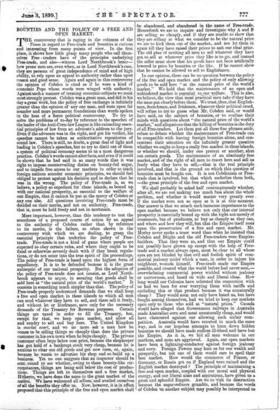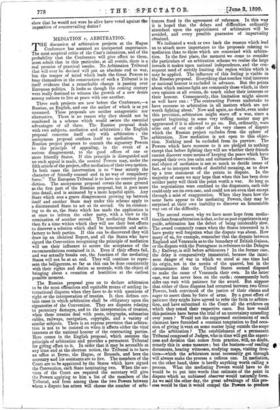BOUNTIES AND THE POLICY OF A FREE AND OPEN MARKET.
MHE controversy that is raging in the columns of the I • Times in regard to Free-trade and bounties is curious and interesting from many points of view. In the first place, it shows how little grasp many people who call them- selves Free - traders have of the principles underlying Free-trade, and also—witness Lord Northbrook's letter— how prone men are, even when, as in Lord Northbrook's case, they are persons of great independence of mind and of high ability, to' rely upon an appeal to authority rather than upon reason and good sense. Again and again in this controversy the opinion of Cobden is cited as if he were a kind of economic Pope whose words were winged with authority. Against such a manner of treating economic subjects we must, most strongly protest. Cobden was a great man, and did in his day a great work, but the policy of free exchange is infinitely greater than the opinion of any one man, and rests upon far sounder and more permanent foundations than words spoken in the heat of a fierce political controversy. To try to solve the problems of to-day by reference to the speeches of the leader of the Anti-Corn-law League is like extracting essen- tial.principles of law from an advocate's address to the jury. Even if the advocate was in the right, and got his verdict, his speeches cannot be taken as authoritative repositories of sound. law. There is still, no doubt, a great deal of light and leading in Cobden's speeches, but to try to distil out of them a system of political economy seems to ns a most dangerous practice. Cobden's words cannot alter facts, and even if it could be shown that he had said in so many words that it was right to impose countervailing duties on bounty-fed sugar, and to impede free access to our markets in order to teach foreign nations sounder economic principles, we should feel obliged to protest against, his decision and to declare that he was in the wrong. The policy of Free-trade is, as we believe, a policy so expedient for these islands, so bound up with our national prosperity, so essential to the welfare of our. Empire, that it cannot be put at the mercy of Cobden or any one else. All questions involving Free-trade must be decided on their merits, and not on authority. Free-trade, that is, must be held freely and not in mortmain.
-More important, however, than this tendency to test the soundness of a proposed course of action by an appeal to the authority of Cobden rather than by reference to its merits, is the failure, so often shown in the controversy with which we are dealing, to grasp the essential principle that underlies the policy of Free- trade. Free-trade is not a kind of game where people are expected to obey certain rules, and where they ought to 'be fined or otherwise severely dealt with if they break regula- tions, •or do not enter into the true spirit of the proceedings. The policy of Free-trade is based upon the highest form, of expediency. It is to be defended because it is the great antiseptic of our national prosperity. But the adoption of the policy of Free-trade does not consist, as Lord North- brook appears to argue, in securing that goods shall be sold here at the natural price of the world's market." It consists in something much simpler than that. The policy of Free-trade properly understood demands that we shall keep a free and open market in these islands to which all men can send whatever they have to sell, and there sell it freely, and without let or hindrance, save only for the necessary demands of the Treasury for Revenue purposes. Certain things are taxed in order to fill the Treasury, but, except for that, we keep open market, and allow all and sundry to sell and buy here. The United Kingdom is market overt, and we no more ask a man how he comes to be selling things so cheaply than does the private customer in his own town when he buys cheaply. The private customer often buys below cost price, because the shopkeeper hai got hold of a bankrupt stock very cheap, because lie is anxious to clear out old goods and get new ones, or, again, because he wants to advertise his shop and so. build up a i business. Yet no one suggests that an inspector should be sent. round to see whether, owing to these bounty-like cir- ctustances,:things are being sold below the Cost of produc- tions. Things are left to themselves and a free market. Hitherto, we have done the same.in the great market of the nation. We have welcomed all sellers,' and availed ourselves of all the benefits they offer us. Now, however, it is in effect proposed that this principle of the free and open market shall .be abandoned, and abandoned in the name of Free-trade. Henceforth we are to inquire and investigate why A and B are selling so cheaply, and if they are unable to show that they are selling at what we consider to be the natural price we are to kick them out of the market,. and not let them in again till they have raised their prices to suit our ideal price. The old plan of inviting all men to sell whatever they have got to sell at whatever price they like is to go, and instead the seller must show that his goods have not been artificially lowered in price by bounties or the like. If he cannot show that he cannot be allowed to sell to Englishmen.
In our opinion, there can be no question between the policy of the free and open market and the policy of only allowing goods to be sold here " at the natural price of the world's market." We hold that the maintenance of an open and unhindered market is essential to,pur, welfare. This is also, we believe, the view that most, practical men take if they have the issue put clearly before them. We trust, then, that English- men, Scotchmen, and Irishmen, whatever their political creed, will refuse to try to guess what Mr. Cobden said, or would have said, on the subject of bounties, or to confuse their minds with questions about " the natural price of the world's market," and allegations that the killing of bounties is the duty of all Free-traders. Let them put all these fine phrases aside, refuse to debate whether the maintenance of Free-trade can be compatible with leaving foreign bounties alone, and con- centrate their attention on the infinitely greater question whether we ought to keep a really free market in these islands, or whether we should, under one pretext or another, shut out certain goods. The maintenance of an absolutely free market, and of the right of all men to resort here and sell us freely what they have to sell,—that is the real principle involved, and that is the ground on which this question of bounties must be.fought out. It is not Cobdenism or Free- trade that is involved, but that which underlies them both, —the great principle of the free and open market.
We shall probably be asked half contemptuously whether, after all, we are not making too much fuss about the whole problem, and whether it would matter very greatly even . if the market were not so open as it is at this moment. Our answer is that we attach such immense importance to the open market because we believe not only that' our internal prosperity is essentially bound up with the right not merely of consumers, but of producers, to buy as cheaply as they can, and where and how they will, but that the Empire itself rests upon the preservation of a free and open market. Mr. Morley never spoke a truer word than when he insisted that Cobden and Bright and the old Free-traders were Empire- builders. That they were so, and that our Empire could not possibly have grown up except with the help of Free- trade and a market always open, must be clear to all whose eyes are not blinded by that evil and foolish spirit of com- mercial jealousy under which a man, in order to injure his neighbour, wounds himself. Free-trade made our Empire possible, and created what the world before had never seen,— overwhelming commercial power wielded without jealousy or narrowness, and based on wide and liberal ideas. How long would our Colonies have tolerated the connection with us had we been for ever worrying theta with tariffs and excluding this or that product because it was unnaturally cheap ? They would soon not only have hated us, but have fought among themselves, had we tried to keep our markets open only to those who sold at "natural prices." Canada would have alleged that Government railways in Australia made Australian corn and meat unnaturally cheap, and would have clamoured against our allowing such unfair com- petition. Australia would have retorted in much the same way, and in our hopeless attempts to hunt down hidden bounties we should have made endless ill-blood and have lost the Empire. As it is, we bid all men welcome in our markets, and none are aggrieved. Again, our open markets have been a lightning-conductor against foreign jealousy and envy. Foreign Powers may hate us for our wealth and prosperity, but not one of them would care to spoil their best market. How would the commerce of France, or Germany, or Russia get on if England were ruined and the English market destroyed ? The principle of maintaining a free and open market, coupled with our moral and physical energy, and our liberal aims and aspirations, have given us a great and splendid Empire. Are eve to 'risk its destruction because the sugar-refiners. grumble, and because the words of Cobden 'm another subject may possibly be interpreted to show that lie would not were he alive have voted against the imposition of countervailing duties?







































 Previous page
Previous page